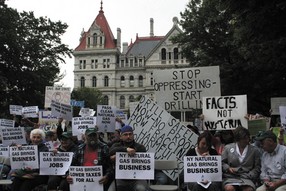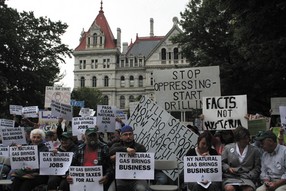| |  | | | |  | | Three economists have written a letter to the DEC outlining the various ways in which these protestors, above, might be wrong in asserting that hydraulic fracturing, or fracking, could economically benefit New York. Photo by Gazette File. |
| |  | | | |  | | Three economists have written a letter to the DEC outlining the various ways in which these protestors, above, might be wrong in asserting that hydraulic fracturing, or fracking, could economically benefit New York. Photo by Gazette File. |
|
December 19, 2011 Three economists say the analyses made in the DEC's draft impact statement on hydraulic fracturing do not accurately address the economic and environmental problems the practice can cause, according to a letter they sent to Gov. Andrew Cuomo last Wednesday.
The letter, signed by Jannette M. Barth, the senior economist at the Pepacton Institute LLC; Edward C. Kokkelenberg, a research fellow at the School for Industrial and Labor Relations at Cornell University; and Timothy Mount, an economics professor at Cornell University, details various reasons they say the economic analysis developed for the DEC's draft supplemental generic impact statement on fracking by the consulting firm Ecology & Environment, Inc. is flawed.
"The state's economic focus should be the realistic identification and estimation of the present value of all costs and benefits to the state and its citizens," the letter reads. "The state should be concerned with maximizing the present value of the benefits to the State and minimizing the present value of all costs to the State and its citizens. The gas industry will strive to maximize the present value of the benefits to themselves and postpone costs, or more likely, make others pay the costs."
Fracking is the process by which a mixture of water, sand and chemicals are injected into the ground at high pressure to open up fissures and allow for easier extraction of natural gas and oil. Opponents say the practice, which would be allowed throughout much of the Southern Tier and Central New York if the DEC begins issuing permits, could be very dangerous to the state's citizens and environment.
"When I look at the work done by the DEC, it seems that they have clearly exaggerated the benefits and ignored many of the economic costs," Barth explained in an interview.
She said the DEC's report ignored how high-volume fracking could affect other parts of the economy. "The report was not at all careful in examining the declines in other industries such as agriculture or tourism.
"It didn't take into account costs of wear and tear of roads and infrastructure," Barth continued. She said the state's Department of Transportation circulated a memo from July detailing the potential damage fracking and well construction could do to roads and other infrastructure, especially from truck traffic.
While the DEC's report maintains that fracking could create as many as 54,000 jobs in the state, the three economists say this number might not be accurate because it was reached by using too many estimates, which have lead to misleadingly high numbers.
"In reality, the creation of jobs is unlikely to be as high as the industry has claimed," Barth said. She went on to suggest that because the oil and gas industry has a lot of money, they can afford to employ research organization and groups to conduct studies for them that would help push their industry's agenda forward. She points to Ecology & Environment, Inc. saying that this organization has been employed by several other gas and oil companies to provide environmental analyses of their practices.
"The research findings done by independent studies are vastly different from industry research," Barth said, saying that any study of fracking should be done not by any single agency, but a team of individual experts on all the ways that fracking could impact the economy and the environment.
"What we really, really need is the state DEC to insist on a comprehensive unbiased peer-reviewed environmental impact statement, based on data that is either published, or carefully scrutinized or verified because the industry has a bias in this," Barth said,
The economists claim that the DEC's impact statement doesn't provide solid enough numbers on how much gas could be produced in a given year and relies too heavily on estimates. For example, the report estimates anywhere between 600 billion and 3.6 trillion cubic feet of gas could be produced in the 23rd year of drilling, a benchmark in the DEC's study. The economists say that this 600 percent deviation shows the assessment doesn't address these types of uncertainties to an acceptable degree.
The DEC's impact statement holds that fracking wells will produce gas for thirty years but the economists say that independent analysts have reported that shale gas wells in other regions produce gas for far fewer years.
DEC Assistant Director of Public Information Emily DeSantis said in response to the economist's allegations, "As with all of comments we receive, we will carefully consider these concerns."
The impact statement is also very vague concerning property values adjacent to well sites, according to the economists' letter. "The above literature review suggests that being in proximity to a well could reduce the value of a property, but that proximity to a gas pipeline might not reduce the value of a property. The proposed natural gas development would have an overall regional effect of increasing property values … However, not all properties in the region would increase in value," the DEC's report reads.
Aside from calling that statement "sufficiently vague to be meaningless," the economists suggest that property values adjacent to wells could drop down to nothing, claiming that lenders are often unwilling to issue mortgages in an uncertain housing market.
Ecology & Environment, Inc. also doesn't address the worst-case scenarios that high-volume fracking could have on the environment, according to the economists' letter. They cite the costs of water contamination and land, stream and air pollution that could be substantial.
"Some contaminants in the fracking fluid and the flowback fluids are endocrine disruptors and carcinogens. All of these can affect not only human health, but also the health of domestic and game animals, and this important cost is ignored," the letter reads.
The economists conclude their letter saying, "The state's policy makers should have better data upon which to make decisions. A comprehensive, unbiased, and respectable economic assessment should be made prior to making any decisions regarding shale gas extraction by means of hydraulic fracturing in New York state. The assessment conducted by Ecology & Environment, Inc. does not meet this standard."
| |
|
|